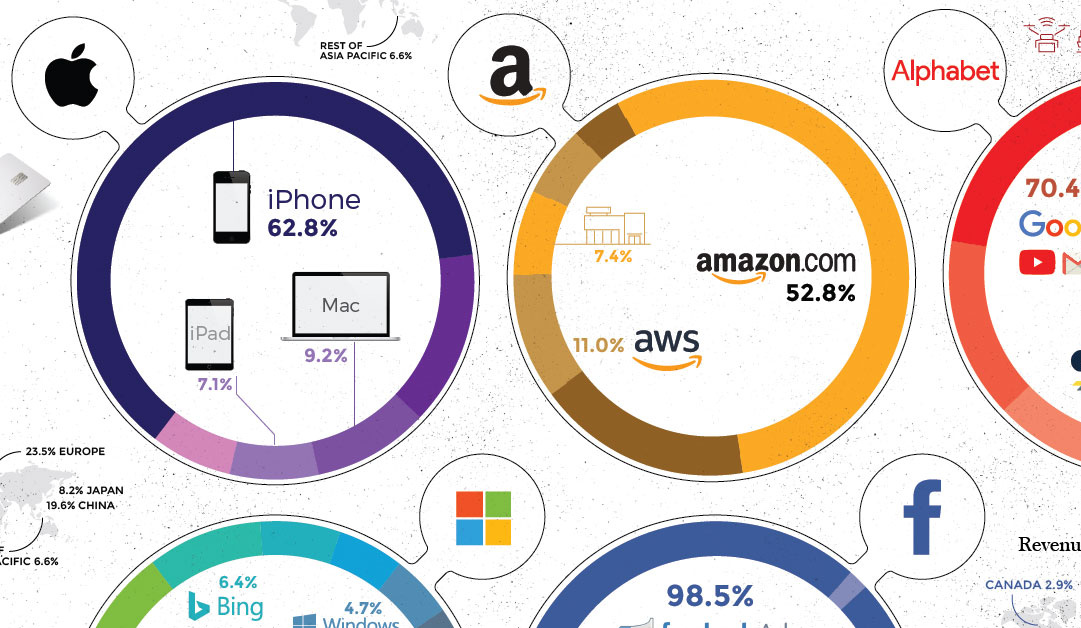Tech Giants Growing Market Value During COVID-19 Pandemic
Global tech giants are taking advantage of the numerous business opportunities that the COVID-19 pandemic is opening up across the globe.
This was evident in the second quarter financial reports of the top 25 technology companies that saw the market capitalisation of the companies expanding quarter-on-quarter during a global health crisis.
According to the Data compiled by GlobalData, Apple’s second-quarter revenue was aided by the strong performance from its services and wearables business units despite COVID-19 disruption. This, according to the data, allowed the tech giant to gain substantial market share and emerged as the world’s most valuable company.
Speaking on the strong financial statements from global tech giants, Keshav Jha, Business Fundamentals Analyst at GlobalData, said: “Apart from its impressive Q2 performance, the announcement of the new iOS and new iMac during Apple’s annual developer conference (WWDC) in June 2020 seemed to have pleased investors with the company’s MCap rising by over 40% during the quarter.
“The second of the top 25 technology companies by MCap was Microsoft. The company’s business accelerated during the company’s Q3 ending March 31 2020 mainly driven by growth in its cloud usage, increased Xbox sales, and higher demand for Office commercial and Dynamics business solutions. The company’s decision to close its physical stores and invest in e-commerce operations to drive sales, as well as the announcement of regular quarterly dividend, helped its stocks reach a new high.
“In third place was Amazon Web Services (AWS), which recorded a huge surge in demand of its cloud services after the COVID-19 outbreak. Additionally, an increase in e-commerce retail demand due to lockdowns imposed by governments in major economies helped Amazon’s stock rise over 40% and its MCap crossed US$1 trillion mark in Q2 2020.”
Alphabet, Facebook and Tencent led in the digital advertising space with over 20 percent quarter-on-quarter growth in their market capitalisation. The report noted that in the last three weeks of Q1 2020, advertisement revenue of Alphabet and Facebook dipped slightly but started showing stability in the first three weeks of April.
This renewed interest in the advertisement of the two companies aided their stocks by 20 percent in April as investors remained strongly bullish due to an increase in consumer engagement on its services because of the quarantine and shelter-in-place orders.
Jha continued: “Although suspension of sports events affected Tencent’s media advertising revenue, its online advertisement and games revenues increased over 30% in Q1 2020, ended March 31, which seemed to help the company win over investors’ confidence.”
For major semiconductor companies such as Samsung, Taiwan Semiconductor, NVIDIA, ASML, Broadcom, Texas Instruments and Qualcomm their market value grew between 9 percent to 45 percent quarter-on-quarter during the period.
Jha adds: “The health crisis led to rise in demand for memory chips, mainly due to higher demand from cloud applications linked to remote working and online education. The continued investment in AI, 5G infrastructure, data center, autonomous vehicles and gaming also kept market interested in these stocks.”
While ServiceNow and Zoom were the two entrants on the GlobalData’s top 25 technology companies ‘my MCap list’. They both grew subscription revenues and widening customer base with ServiceNow closing 37 deals in the first quarter. Zoom usage surged by 75.6 percent quarter-on-quarter in the second quarter of 2020.
Jha concludes: “The economic downturn caused by COVID-19 has impacted all sectors, but the performance of tech stocks in Q2 suggests that investors believe they can successfully manage the headwinds from the health crisis. Tech companies are uniquely positioned to provide technology and resources to organizations and partners, which help in securely accessing and sharing data while working remotely. These companies are also playing pivotal role for consumers coping with lockdown measures, and in enabling health institutions and governments to maintain databases, which help in containing the spread of virus.”
Please note that the technology companies include software and hardware developers, IT services providers (including internet-based services providers), and electronics manufacturers including semiconductors, mobile devices etc.




 Forex3 weeks ago
Forex3 weeks ago


 Naira3 weeks ago
Naira3 weeks ago
 Billionaire Watch2 weeks ago
Billionaire Watch2 weeks ago






 Naira3 weeks ago
Naira3 weeks ago






 Naira2 weeks ago
Naira2 weeks ago




 Naira1 week ago
Naira1 week ago




 Naira4 weeks ago
Naira4 weeks ago






 Naira1 week ago
Naira1 week ago

















